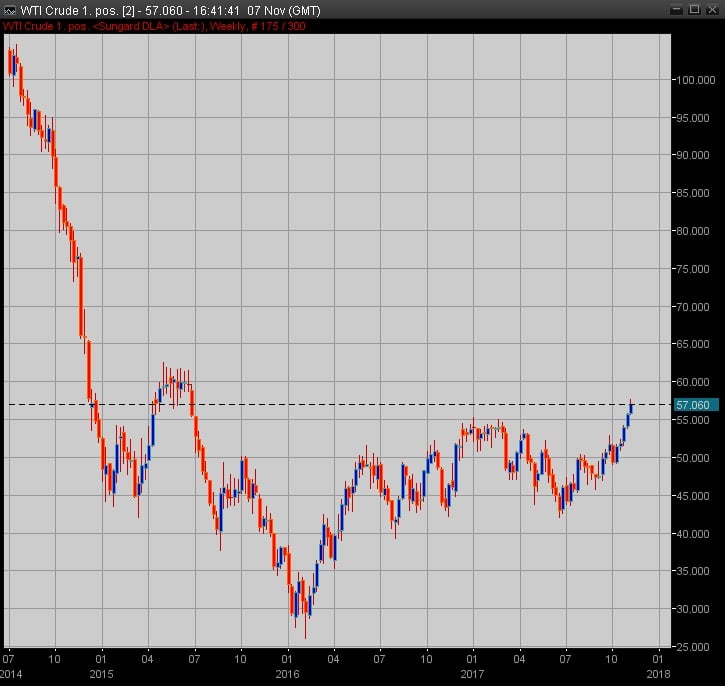Poloz Seen Clearing the Way for Crude Oil Rally to Drive Canadian Dollar Gains
- Written by: James Skinner

The BoC has so-far been vindicated for its increasingly cautious tone but, with oil up 6% in the last week, strategists say the Loonie is due some recognition.
Bank of Canada governor Stephen Poloz is seen removing the last remaining hurdle to Canadian Dollar gains with the passing of a key speech in Montreal Tuesday.
The governor will speak about modern policymakers’ understanding of inflation at the Chartered Financial Analyst Society of Montreal around 17:55 London time.
His address is dedicated to a salient topic given the BoC’s recent downgrades to its own inflation forecasts and the fact that rate setters the world over are now questioning whether there could be permanent factors weighing on inflation that officials are yet to recognise.
“A dovish Poloz presents a risk this afternoon but we doubt that he will present any “new” news,” says Richard Kelly, head of global strategy at TD Securities.
Fears are that Poloz’s speech could yield renewed warnings of the challenges posed to the BoC inflation target by a stronger Canadian Dollar, as well as more Dollar-negative talk on inflation forecasts, but the speech also comes against a backdrop of surging oil prices.
“Our HFFV [model] estimate shows USDCAD is trading with little bias but we also note that CAD has lagged the move in oil prices,” Kelly notes.
West Texas Intermediate crude oil futures, the most liquid North American oil contract, have risen by 5.8% since Friday’s noon to trade at $57.69 per barrel Tuesday, their highest level since July 2015.

West Texas Intermediate crude futures shown at weekly intervals. Source: Netdania Markets.
This is a positive development for the Canadian economy, given its large oil industry, and for the Loonie. But oil’s gains are yet to make a meaningful dent in the USD/CAD rate, or in any other Loonie pairs.
USD/CAD rate shown at hourly intervals. Captures CAD strength and subsequent weakness.
“The 90d rolling correlation of oil prices and USDCAD is now sitting at cyclical lows, which leaves the pair sensitive to a break in the recent oil trading range,” Kelly adds.
TD Securities’ strategy team are betting on a rise in the Canadian Dollar and, Monday, recommended clients sell the USD/CAD rate short around the 1.2770 level, placing a stop loss at 1.2960 and a target at 1.2380. The USD/CAD rate was quoted 0.62% higher at 1.2792 Tuesday.
“CAD has been one of the notable underperformers in the G10 since the peak in the convergence trade late in Q3 but we suspect that much of the bad news is priced,” Kelly says.
The TD Securities call is almost contrarian at present given many economists view the current 25% market implied probability of another Bank of Canada rate hike in 2017 as unrealistic.
Should economists be proved right and the BoC eschew another rate hike at its December meeting, the Canadian Dollar might see further downside. Tuesday’s speech from Poloz could give an early read on the likely tone of the BoC come December.
“We think the market is overpricing the path of rate hikes from the Bank of Canada for now,” says Gek Teng Khoo, a strategist at Morgan Stanley. “The market is pricing in 2 more rate hikes by the end of 2018, but BoC Governor Poloz sounds increasingly cautious in his communications.”
Governor Poloz and other BoC rate setters have so far been vindicated for their increasingly cautious tone.
Canadian GDP growth turned negative in August, after stalling to a halt back in July, suggesting the third quarter was one that saw the economy soften.
Weaker growth comes closely on the heels of two back-to-back interest rate hikes pushed through by the BoC between July and September.
“We think the slowdown reflects a more sustainable pace of consumer spending, which would be consistent with a moderation in job growth last quarter,” says Josh Nye, an economist at RBC Capital Markets.
Weaker growth over the course of the third quarter followed an exceptionally strong second quarter, which was seen as the original catalyst that propelled the BoC into action. There is less divergence between economists and strategists on the outlook for BoC policy in 2018.
“We agree that it looks like the bank will be a bit more patient in removing accommodation but continue to think a near-capacity economy calls for higher interest rates,” Nye adds.
Get up to 5% more foreign exchange by using a specialist provider by getting closer to the real market rate and avoid the gaping spreads charged by your bank for international payments. Learn more here.




